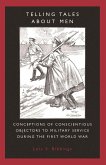An analysis of the Military Service Tribunals which considered applications for exemption from men during the First World War, this book illuminates a previously under-researched area of British military and social history.
Military Service Tribunals were formed following the introduction of conscription in January 1916, to consider applications for exemption from military service. Swiftly, they gained two opposing yet equally unflattering reputations. In the eyes of the military, they were soft, obstructionist 'old duffers'. To most of the men who came before them, they were the unfeeling civilian arm of a remorseless grinding machine. This work, utilising a rare surviving set of Tribunal records, challenges both perspectives. Wielding unprecedented power yet acutely sensitive to the contradictions inherent in their task, the Tribunals were obliged, often at a conveyer belt's pace, to make decisions that often determined the fate of men. That some of these decisions were capricious or even wrong is indisputable; the sparse historiography of the Tribunals has too often focused upon the idiosyncratic example while ignoring the wider, impact of imprecise legislation, government hand-washing and short-term military exigencies.
Military Service Tribunals were formed following the introduction of conscription in January 1916, to consider applications for exemption from military service. Swiftly, they gained two opposing yet equally unflattering reputations. In the eyes of the military, they were soft, obstructionist 'old duffers'. To most of the men who came before them, they were the unfeeling civilian arm of a remorseless grinding machine. This work, utilising a rare surviving set of Tribunal records, challenges both perspectives. Wielding unprecedented power yet acutely sensitive to the contradictions inherent in their task, the Tribunals were obliged, often at a conveyer belt's pace, to make decisions that often determined the fate of men. That some of these decisions were capricious or even wrong is indisputable; the sparse historiography of the Tribunals has too often focused upon the idiosyncratic example while ignoring the wider, impact of imprecise legislation, government hand-washing and short-term military exigencies.








